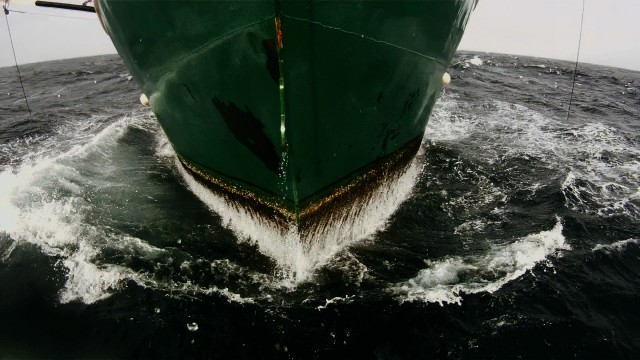
Well, film had a good run.
When 2013 wraps up, it will mark the last year major Hollywood releases films on 35 mm. The studios’ switch to digital is ostensibly for cost savings — though, as International Film Series Director Pablo Kjolseth points out, he’s not seeing any cheaper fees — but it put a squeeze on little guys, like Kjolseth and the IFS, who suddenly faced the daunting task of buying specialty digital cinema projectors (DCPs), which can cost up to $100,000.
But after almost a year of fundraising — with help from donors such as Jerry Aronson, Derek Cianfrance, South Park Producer Eric Stough, the MacArthur Foundation and the CU film studies department — the IFS was able to raise enough money to upgrade its equipment.
And so begins another era for the IFS. A Boulder institution for more than 70 years, the IFS’s fall season kicks off Monday, Sept. 16, with a free double screening in Muenzinger Auditorium — both projected digitally.
Renoír, a biopic of famous painter Pierre-Auguste, and Leviathan, a visually staggering documentary about deep-sea fishing vessels that James Franco recently dubbed “modern-day Melville,” kick off the season. On each subsequent Tuesday, the IFS will screen a documentary. Wednesdays will see obscure, hardto-find movies dubbed as “specialty arthouse.” Thursdays will see films co-sponsored by Alamo Drafthouse Cinema, and the weekends will be a catchall for various themes, from films fresh off the festival circuit to a food-on-film festival and a retrospective of Japanese director Kiyoshi Kurosawa.
Thursday nights will see an interesting series, guest curated by Dan Halsted, head programmer of the Hollywood Theatre in Portland, Ore. Called “Handmade Monsters,” the series is a tribute to special effects pioneer Ray Harryhausen, who died this year. Harryhausen’s “Dynamation” was an instantly recognizable brand of stop-motion special effects that allowed movies like Jason and the Argonauts (1963) and Clash of the Titans (1981) to stage epic battles before the days of CGI and digital monsters.
“What you’ve got with the stop-motion is that you can see with the monsters; it’s all analog,” Kjolseth says. “There’s no green screen. There’s no CGI. It’s all being done stop-motion, and it has a very unique look to it. And, because it’s on film, it’s got a visual feel to it that’s also very different.”
Of the seven films showing on Thursday at the IFS, only one (The 7th Voyage of Sinbad, showing Oct. 17 in the Visual Arts Center on the CU campus) features special effects by Harryhausen, but the rest feature similar stop-motion techniques.
Another feature will be the Kiyoshi Kurosawa retrospective, happening on two consecutive weekends, Oct. 25-27 and Nov. 1-3. No relation to Akira Kurosawa, Kiyoshi Kurosawa is a contemporary Japanese filmmaker whose films have marked differences from the standard Hollywood fare, Kjolseth says. All screenings will be free, courtesy of the Consulate- General of Japan in Denver.
“He’s been making films since the ’80s,” Kjolseth says. “He’s known as being unsettling and being disturbing. … He’s got this aesthetic where he does things on the peripheral side. Most Western movies are based on front and center, and everything happens right in front. He’ll have a body just fly off a building on the side. If you’re not paying attention, you’re like, ‘What’s happening?’ It’s this unsettling way of doing things that really puts him in another category.”
Frequent IFS volunteer Julia Joun will guest-curate the Chow Down! IFS Food Film Festival, featuring two feature films and four documentaries and corresponding events, screening Oct. 9-13. The first film, Garlic is as Good as Ten Mothers, will show at the Boulder Public Library on Wednesday, Oct. 9, as a tribute. The film’s director, Les Blank, passed away earlier this year.
Other highlights include a screening of the freshly restored classic M, Fritz Lang’s gritty look at how a child murderer terrifies a city and arouses the ire of the underworld. Richard Linklater’s first film, Slacker, will screen on Nov. 13, and Kjolseth says that the copy IFS will show is the last remaining 35 mm print of the film. Room 237 (Sept. 24) highlights various conspiracy theory-level interpretations of The Shining.
It looks to be a full season for the IFS. Kjolseth’s deep love for celluloid carries on in the face of a sweeping digital revolution. But, as he points out, 12 out of the roughly 50 films the IFS is showing this season are on film, not ones and zeros.
“Telluride [Film Festival] is known as the haven for true cinephiles,” Kjolseth says. “Out of all their movies, only 10 were on film. So technically, we are showing more films this season on film than Telluride.”
Visit www.internationalfilmseries.com for a complete schedule and list of films.
Respond: [email protected]














